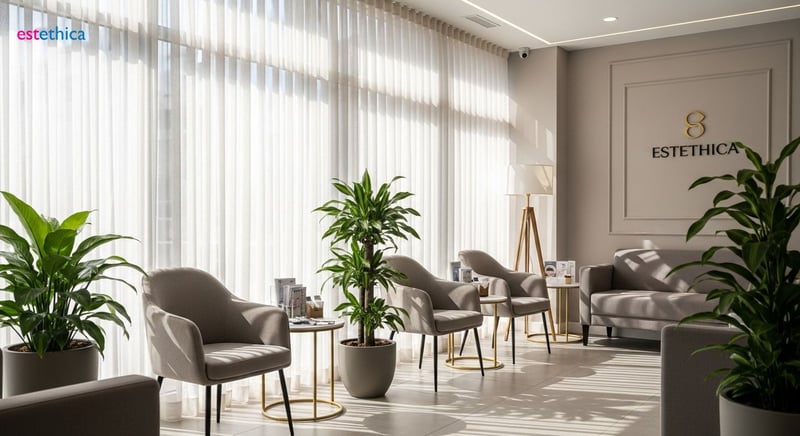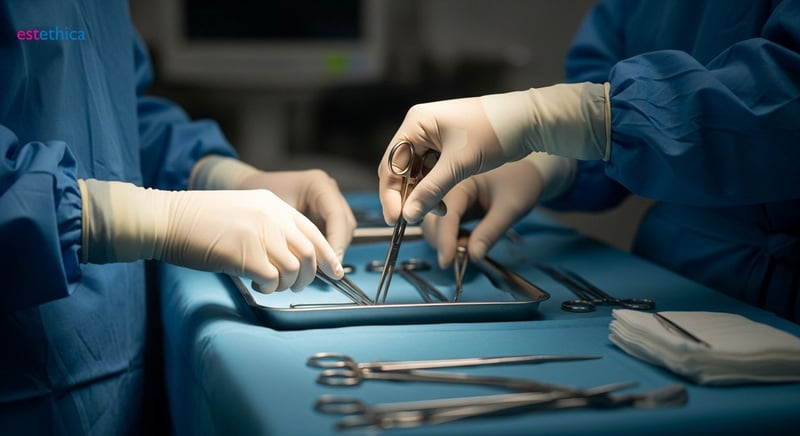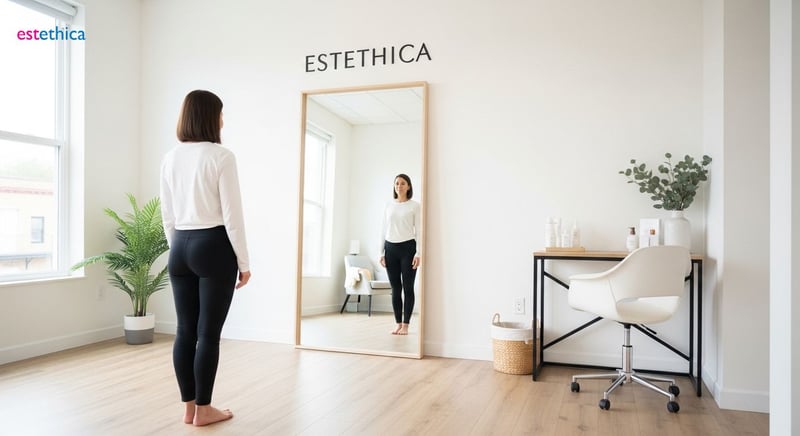Rhinoplasty Unveiled: Reshape Your Nose, Redefine You
Transform your appearance and enhance function with rhinoplasty. Discover expert insights and recovery tips.
The decision to undergo rhinoplasty, also known as a nose job, is both personal and transformative. This surgery can not only enhance your appearance but also improve nasal function, adding a new dimension to your quality of life. In this guide, we delve into the various aspects of rhinoplasty, from understanding its techniques to navigating through recovery.
Beyond Aesthetics: Understanding the Functional Benefits of Nose Surgery
Functional Improvements through Rhinoplasty
Rhinoplasty, often perceived as a cosmetic procedure, offers substantial functional benefits that significantly improve the quality of life for many individuals. Beyond aesthetic enhancements, nose surgery can rectify structural issues that impede nasal function, leading to enhanced breathing and overall respiratory health. Addressing these functional problems can dramatically reduce discomfort and improve daily activities, such as sleeping and exercising.
- Improved Breathing: Rhinoplasty can correct a deviated septum, a common cause of obstructed airflow. This leads to easier breathing, reduced snoring, and better sleep quality.
- Sinus Issues Relief: Correcting nasal structures can improve sinus drainage, reducing chronic sinus infections.
- Enhanced Physical Performance: By improving airflow, individuals may experience better stamina and performance during physical activities.
Many patients seek rhinoplasty to address both aesthetic and functional concerns simultaneously, resulting in a more balanced and harmonious facial appearance combined with improved nasal function. Surgeons often emphasize the importance of evaluating and addressing functional issues during the consultation process to achieve the best possible outcome.
Combining Septoplasty and Nasal Reconstruction for Enhanced Function
Nasal reconstruction, an integral component of certain rhinoplasty procedures, plays a pivotal role in restoring both the form and function of the nose. This is especially crucial for individuals who have suffered trauma, congenital disabilities, or undergone previous surgeries that compromised nasal structures. Combining septoplasty with nasal reconstruction ensures that not only is the external appearance improved, but also that the internal nasal passages are optimized for efficient airflow.
- Initial Assessment: A comprehensive examination is conducted to assess the extent of structural damage and functional impairment.
- Surgical Correction: Septoplasty corrects the deviated septum, while nasal reconstruction rebuilds or reshapes the nose using cartilage grafts or implants if necessary.
- Post-operative Care: Careful monitoring and care are provided to ensure proper healing and optimal function.
The expertise of the surgeon is crucial in achieving a seamless integration of aesthetic and functional improvements. For example, Esthetica Global's approach to rhinoplasty focuses on addressing underlying functional issues alongside cosmetic desires, ensuring patients receive comprehensive and tailored care. This dual approach enhances both health and appearance, providing a significant boost to the patient's overall well-being. Moreover, ethnic rhinoplasty for example, also necessitates a detailed approach that considers both form and function.

Rhinoplasty Techniques: Exploring Open vs. Closed Approaches
Advantages and Disadvantages of Open Rhinoplasty
Open rhinoplasty, distinguished by an incision on the columella, provides the surgeon with a comprehensive view of the nasal structure. This approach is frequently employed in complex cases requiring significant reshaping, such as those involving severe asymmetries, revisions, or extensive grafting. The enhanced visibility allows for precise adjustments, optimizing both functional and aesthetic outcomes. Esthetica Global emphasizes detailed pre-operative planning to determine the most suitable surgical technique for each patient, ensuring outcomes that align with their specific needs and expectations.
- Enhanced Visibility: Offers the surgeon a complete view of the nasal framework.
- Precise Adjustments: Facilitates complex reshaping and grafting procedures.
- Structural Correction: Ideal for correcting significant nasal asymmetries.
While open rhinoplasty offers unparalleled access and control, it is associated with a slightly longer recovery period and a small visible scar. This incision, however, typically heals well and becomes inconspicuous over time. The choice between open and closed techniques is a personalized decision, carefully considered by the surgeon and patient together.
Indications and Benefits of Closed Rhinoplasty
Closed rhinoplasty, characterized by incisions made exclusively inside the nostrils, offers the advantage of no visible external scarring. This approach is often favored for minor to moderate nasal corrections, such as refining the nasal tip or reducing a small dorsal hump. With a shorter recovery period compared to open rhinoplasty, patients can typically return to their normal activities sooner. Esthetica Global's surgeons are adept at performing closed rhinoplasty with precision, achieving natural-looking results with minimal downtime. The technique is particularly appealing to individuals seeking subtle enhancements without visible signs of surgery.
- Minimal Scarring: Incisions are made inside the nostrils, leaving no visible external scars.
- Faster Recovery: Patients typically experience a quicker return to normal activities.
- Subtle Enhancements: Ideal for refining the nasal tip and correcting minor imperfections.
The selection of closed rhinoplasty is dependent on the patient’s specific anatomical structure and desired outcomes. A thorough evaluation is crucial to determine if this technique is suitable for achieving the desired results. Considering factors such as skin thickness, cartilage strength, and the extent of the required modifications allows for a tailored approach that optimizes patient satisfaction. For instance, issues like breathing problems and nasal asymmetry are carefully assessed to decide on the most effective method.

Navigating Rhinoplasty Recovery: Tips for a Smooth Healing Process
Essential Steps for a Seamless Rhinoplasty Recovery
The recovery period following rhinoplasty is critical for achieving the best possible outcome. While some swelling and bruising are to be expected, understanding and meticulously following your surgeon's aftercare instructions can significantly impact the overall quality and speed of your recovery. Adopting healthy habits and protecting your nose during this period will support optimal healing.
- Proper Diet: Consuming nutrient-rich foods aids in tissue repair and minimizes inflammation, promoting faster healing.
- Elevated Sleeping Position: Sleeping with your head elevated helps reduce swelling and congestion during the initial recovery phase.
- Sun Protection: Shielding your nose from direct sunlight prevents hyperpigmentation and ensures even skin tone as it heals.
For example, avoiding salty foods can further minimize swelling, while gentle facial massages, as advised by your surgeon, can improve circulation and reduce scar tissue formation. Patients who diligently follow these guidelines often experience a smoother and more comfortable recovery.
Optimizing Long-Term Results After Nose Surgery
Achieving the final, refined results from a nose surgery requires patience and adherence to long-term care practices. While initial recovery is relatively quick, the complete settling of tissues and refinement of the nasal contours can take up to a year. During this period, it's crucial to protect the nose from trauma and follow any specific instructions provided by your surgeon.
- Avoid Strenuous Activities: Refrain from activities that could potentially cause impact to the nose during the early stages of recovery.
- Careful Use of Eyewear: If you wear glasses, ensure they do not place pressure on the nasal bridge; using tape or special supports can help.
- Regular Follow-Up Appointments: Attend all scheduled follow-up appointments with your surgeon to monitor your healing progress.
For instance, patients are often advised to avoid contact sports for several months post-surgery. Esthetica Global offers comprehensive post-operative support to guide patients through each stage of recovery, ensuring they achieve the best possible long-term outcomes. For example, Esthetica Global also considers ethnic rhinoplasty, which takes into account the unique anatomical considerations of different ethnic backgrounds, requiring a tailored approach to ensure aesthetically pleasing and functionally sound results are achieved. Consistent communication with your surgical team is key to addressing any concerns and ensuring a satisfactory result.

Is a Nose Job Right for You? Evaluating Candidacy and Expectations
Assessing Factors for Rhinoplasty Candidacy
Determining whether a rhinoplasty, or nose job, is the right choice involves considering various factors, including physical health, psychological readiness, and realistic expectations. Ideal candidates are individuals with specific, well-thought-out goals for improving their nasal appearance or function. A comprehensive evaluation by a qualified surgeon is essential to determine suitability and ensure the procedure aligns with the patient's overall well-being. Understanding that results can vary and that perfection is unattainable is vital for satisfaction.
- Physical Health: Candidates should be in good overall health to minimize surgical risks and promote optimal healing.
- Realistic Expectations: Understanding the limitations of surgery and having realistic goals is crucial for satisfaction.
- Psychological Readiness: Emotional stability and a clear understanding of the surgery's impact are important.
For instance, patients with underlying health conditions such as uncontrolled diabetes or severe heart issues may not be suitable candidates. Consultation with an experienced rhinoplasty surgeon is critical to discussing personal motivations and assessing potential outcomes.
Aligning Goals with Surgical Possibilities in Nose Surgery
The consultation with a skilled surgeon is a pivotal step in the rhinoplasty journey, offering an opportunity to discuss desired outcomes and understand the possibilities that surgery can realistically achieve. During this consultation, the surgeon can provide insights based on their expertise and past surgeries, tailoring the procedure to harmonize with the individual's facial anatomy and cosmetic objectives. Effective communication ensures that both the surgeon and patient have aligned expectations, leading to a more satisfying result. For example, the intricacies of ethnic rhinoplasty often require an even more detailed and culturally sensitive approach.
- Detailed Consultation: Discuss your goals and concerns with a qualified surgeon.
- Anatomical Assessment: The surgeon evaluates your nasal structure and facial features.
- Personalized Plan: A tailored surgical plan is developed to meet your specific needs and desires.
It’s important to note that while a surgeon can enhance nasal appearance and function, achieving the "perfect" nose is often an unrealistic expectation. Instead, surgeons like those at Esthetica Global aim to create a nose that complements the patient's overall facial features and enhances their natural beauty. This approach ensures a balanced and harmonious aesthetic outcome, boosting the patient's confidence and self-esteem. For example, a liquid nose job might be discussed as an alternative, but it’s crucial to understand its limitations compared to traditional rhinoplasty.
Understanding Rhinoplasty: A Comprehensive Guide
Advanced Rhinoplasty Techniques: Open and Closed Approaches for Functional and Aesthetic Results
Seamless Rhinoplasty Recovery: Minimizing Swelling and Optimizing Long-Term Results
Frequently Asked Questions
What are the functional benefits of Rhinoplasty beyond aesthetics?
What are the key differences between open and closed Rhinoplasty techniques?
What are the essential steps for a smooth Rhinoplasty recovery?
How do I determine if a Nose Job is right for me, and what expectations should I have?
Achieve your aesthetic goals with 'estethica's' personalized treatment plans and expert care.
📞 Get Your Free Consultation!